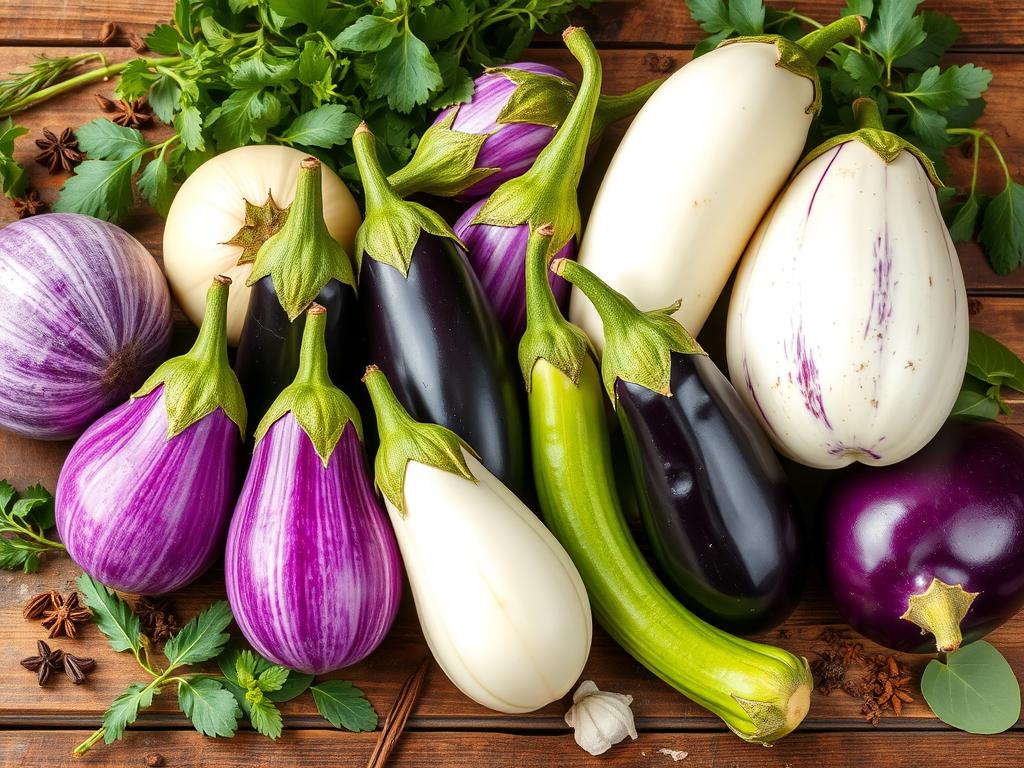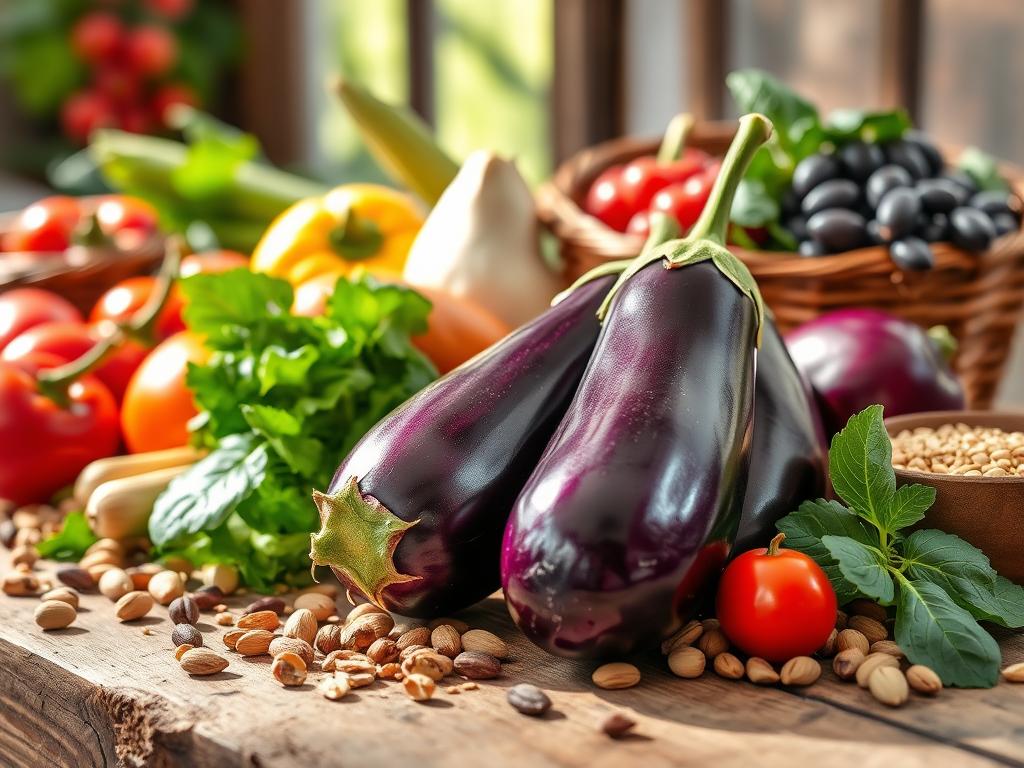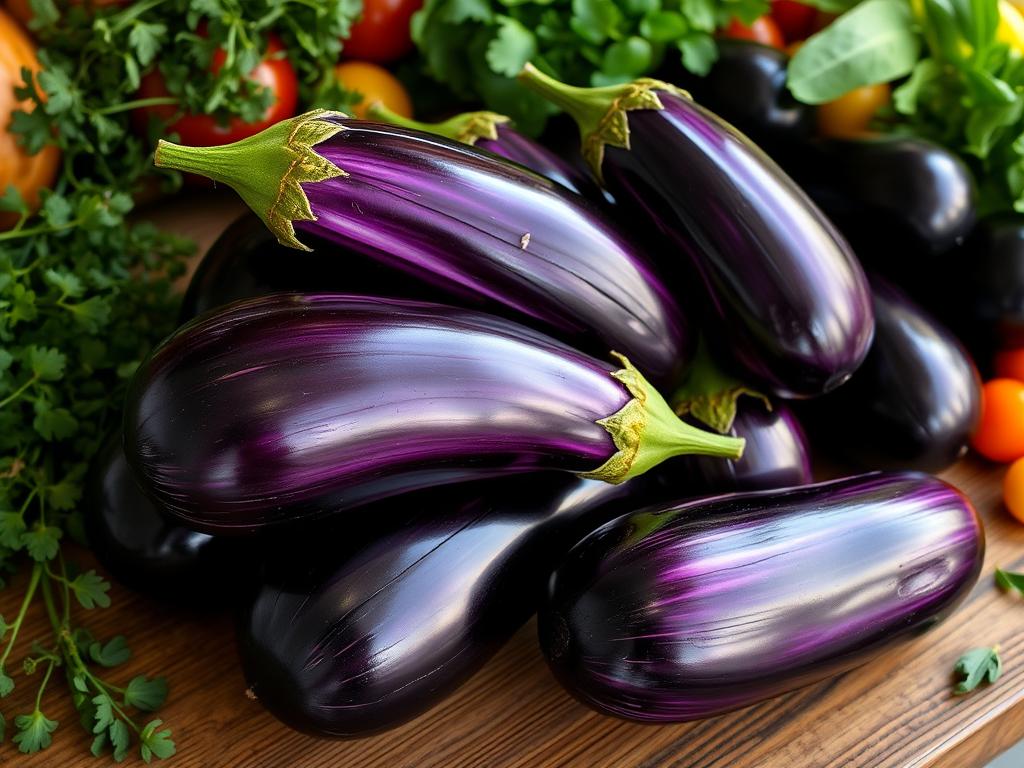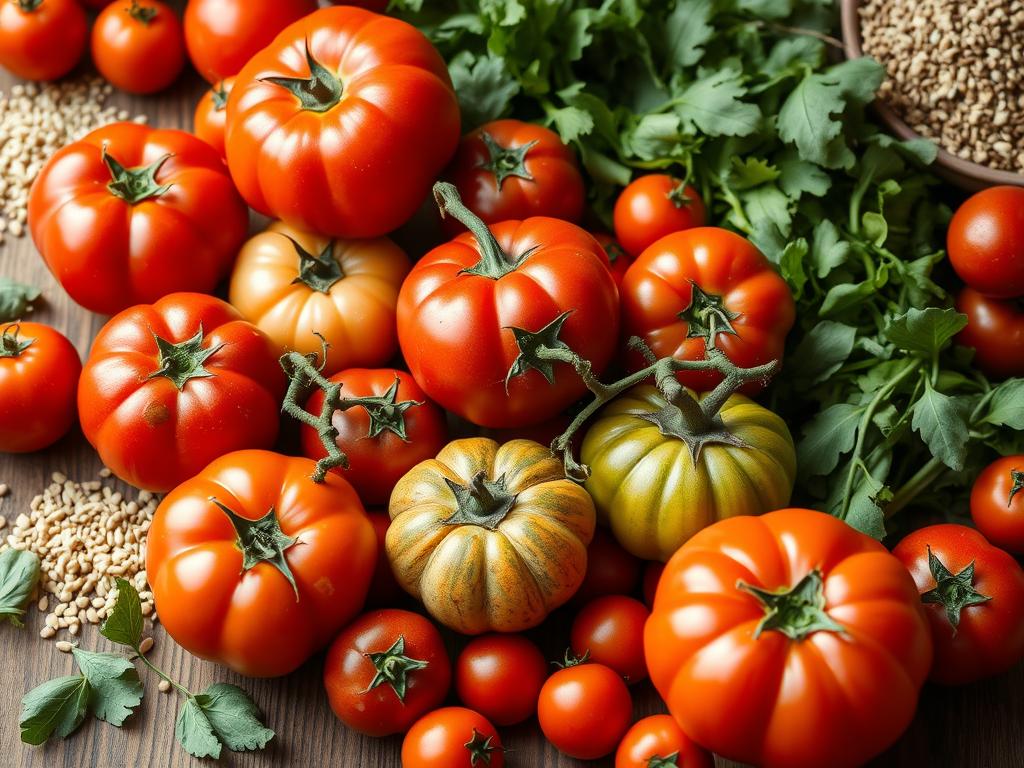Have you ever taken a moment to appreciate the rich, velvety taste of a perfectly cooked eggplant? It’s more than just a vegetable; it holds stories and memories of family dinners, summer barbecues, and creative culinary adventures. Picture this: the sun setting, the smell of grilled eggplant wafting through the air, and laughter ringing around the table as loved ones savor each bite.
Eggplant, also known as aubergine, is not only a delicious vegetable but also a nutritious vegetable that can transform our meals and enhance our health. It boasts numerous health benefits, making it an essential addition to your diet. Join us as we explore the fantastic world of eggplant—from its varieties to its significant health benefits and delightful preparation methods.
Key Takeaways
- Eggplants are low in calories, with only about 35 calories per cup cooked.
- Rich in dietary fiber, eggplants support digestive health and weight management.
- Eggplants are packed with essential vitamins and minerals like potassium and vitamins C, K, and B6.
- The antioxidants in eggplants help protect cells from damage and support heart health.
- This delicious vegetable offers versatility in cooking, making it easy to incorporate into various dishes.
What is Eggplant?
Eggplant, a versatile member of the nightshade family, offers a unique taste and a variety of culinary applications. Known for its glossy skin and spongy texture, this vegetable is available in several colors and shapes, making it an attractive addition to any dish. With different eggplant varieties such as Globe, Italian, and Japanese, each type brings its own flavor profile and cooking characteristics, enriching the experience for those who enjoy cooking and healthy recipes.
An Overview of Eggplant Varieties
Eggplant comes in various forms, each tailored to specific culinary uses. Here are a few notable eggplant varieties:
- Globe Eggplant: The most common variety, featuring a round shape and deep purple skin.
- Italian Eggplant: Similar to the globe but smaller and often has a slightly sweeter taste.
- Japanese Eggplant: Long and slender, this variety has a milder flavor, making it great for grilling.
Nutritional Profile of Eggplant
Analyzing the eggplant nutrition reveals impressive health benefits. One cup of cubed, raw eggplant contains only 20 calories, making it an excellent choice for those looking to maintain a healthy diet. It comprises:
| Nutrient | Amount per Cup |
|---|---|
| Calories | 20 |
| Protein | 1 gram |
| Fat | 0 grams |
| Carbohydrates | 5 grams |
| Fiber | 2.5 grams |
| Sugar | 3 grams |
Notably, eggplant is composed of about 75 percent water and is rich in essential vitamins like A and C. It also provides a significant amount of potassium, folate, and manganese, supporting overall health. The presence of antioxidants, particularly nasunin, contributes to its potential protective effects against chronic diseases such as cancer and heart problems.

Health Benefits of Incorporating Eggplant
Incorporating eggplant into your meals can offer a variety of health benefits, making it a valuable addition to your diet. Known for its unique flavor and versatility, eggplant not only enhances culinary creations but also contributes significantly to overall health.
Weight Management
Eggplant stands out as a favorable choice for those looking to manage their weight. With approximately 2.5g of dietary fiber per one cup of cooked eggplant, this vegetable promotes a feeling of fullness, which may help to curb overeating. Compared to other carbohydrate-rich foods, eggplant is low in calories, containing only 35 calories per cup. These attributes make eggplant a great option for a heart-healthy food while supporting effective weight management.
Heart Health
The eggplant health benefits extend to heart health as well. It contains vital nutrients such as potassium and antioxidants that support cardiovascular function. Research suggests that compounds like chlorogenic acid can reduce levels of low-density lipoprotein (LDL) cholesterol, lowering the risk of heart disease. Regular consumption of eggplant may help maintain healthy cholesterol levels, contributing to a stronger heart and overall well-being.
Antioxidant Properties
Eggplant is rich in antioxidants, including nasunin, which is found in the skin of the vegetable. These antioxidants combat oxidative stress, an imbalance that can lead to chronic diseases like cancer. The polyphenols present in eggplant are believed to protect the body from tumor growth and may help prevent the spread of cancer cells. By adding this nutritious vegetable to your diet, you can take significant steps toward enhancing your overall health. For more information on the various benefits of eggplant, check out this link: eggplant health benefits.

| Nutrient | Amount per 1 Cup (99g) | Health Contribution |
|---|---|---|
| Calories | 35 | Low-calorie option for weight management |
| Fiber | 2.5g | Promotes fullness and aids in digestion |
| Potassium | Varies | Supports heart function and blood pressure regulation |
| Vitamin B6 | 85mcg | Essential for brain health and metabolism |
| Nasunin | Present in skin | Antioxidant protecting brain cells |
| Chlorogenic Acid | Present | May help reduce LDL cholesterol |
Delicious Ways to Prepare Eggplant
Cooking with eggplant opens a world of possibilities, allowing you to explore various cooking methods and recipes. This versatile vegetable enhances dishes with its unique flavor and texture. Here’s how to make the most of eggplant, from grilling to innovative recipes.
Grilling and Roasting Techniques
Grilling brings out a smoky, rich essence in eggplant, making it a favorite for many. The process of salting eggplant before cooking is highly recommended, as it removes excess moisture and bitterness, leaving you with a tender outcome. Try techniques such as:
- Grilling: Cut into thick slices, brush with olive oil, and grill until charred.
- Roasting: Cube and toss with herbs, then roast for added sweetness.
- Baking: Layer in a casserole with your favorite ingredients for a hearty dish.

Eggplant in Mediterranean Cuisine
Eggplant plays a central role in Mediterranean cuisine, with beloved classics like Eggplant Parmesan and Greek Moussaka. These eggplant dishes highlight the vegetable’s adaptability. Here are some popular Mediterranean recipes:
- Grilled Eggplant with Whipped Feta
- Easy Greek-Style Eggplant
- Vegetarian Stuffed Eggplant
- Easy Eggplant Parmesan
For additional inspiration, explore the nuances of delicious vegetable recipes influenced by various regions and cooking styles.
Innovative Eggplant Recipes
Beyond traditional dishes, the scope of cooking with eggplant continues to expand. Innovative recipes such as Eggplant Lasagna and Baba Ganoush showcase the vegetable’s versatility. Some exciting preparations include:
- Eggplant Rollatini
- Loaded Baba Ganoush
- Eggplant Salad
- Grilled Ratatouille Tartines
The variety of eggplant dishes extends to casseroles, dips, and even snacks like eggplant fries and pizza bites. Whether you are vegan or vegetarian, these recipes cater to diverse dietary preferences while ensuring delightful flavors.
Tips for Selecting and Storing Eggplant
When it comes to incorporating eggplant into your meals, understanding how to choose the best ones and store them properly is essential. Selecting eggplant that is both fresh and flavorful enhances your culinary experience. Follow these tips to ensure you’re getting the most out of this versatile vegetable.
Choosing the Right Eggplant
To begin, look for eggplants that have a firm and shiny skin. Avoid those with blemishes or soft spots, as these indicate that the eggplant may be past its prime. The weight of the vegetable is crucial; it should feel heavy for its size, signifying juiciness. Smaller varieties typically have fewer seeds and bitterness, making them ideal for cooking. Research shows that modern eggplant breeds have had about 50% of their bitterness bred out compared to historical varieties.
Proper Storage Methods
Proper storage for eggplant plays a significant role in maintaining its quality. Keep whole eggplants unrefrigerated in a cool, dark place, ideally between 50º to 54º Fahrenheit, for up to a week. This prevents them from becoming bitter or mushy. If you’ve cut them, wrap the pieces tightly in plastic wrap and aim to use them within a couple of days for optimal flavor and texture. For longer-term storage, frozen eggplant can last 6-8 months when stored correctly, making it a valuable choice year-round, especially as the peak season runs from July through October.
By following these guidelines for selecting eggplant and ensuring proper storage, you’ll enhance your ability to experiment with different recipes. For more insights on exploring vegetables and fruits, you can check out this guide.
Common Misconceptions about Eggplant
Eggplant is often surrounded by various misconceptions that can hinder its appreciation in the culinary world. Understanding these eggplant misconceptions helps consumers use this versatile ingredient more effectively. One major question arises: is eggplant a fruit or vegetable? It’s essential to clarify this to maximize the culinary potential of this unique food.
Is Eggplant a Fruit or Vegetable?
Botanically, eggplant is a fruit, specifically classified as a berry. This classification might be surprising to some, as it is typically prepared as a vegetable in a wide variety of dishes. By recognizing that eggplant is a fruit, consumers can better appreciate its culinary applications. It is rich in fiber, which contributes to feelings of satiety, promotes a healthy gut microbiome, and adds nutritional value to meals.
Addressing the Bitter Taste Debate
Many people associate eggplant with a bitter taste, leading them to avoid it altogether. This perception can largely stem from improper preparation methods. Administering a simple technique like salting the eggplant before cooking can draw out moisture and any bitterness, transforming its flavor. This preparation reveals that eggplant can be rich and delightful rather than off-putting. Understanding and addressing these misconceptions can open up numerous avenues for incorporating this nutritious ingredient into daily meals.
| Misconceptions | Reality |
|---|---|
| Eggplant is a vegetable | It is botanically classified as a fruit (berry) |
| Eggplant always tastes bitter | Bitterness can be removed through proper preparation methods like salting |
| All nightshades are high in oxalic acid | Eggplant is low in oxalic acid, making it safe for most diets |
| Eggplant can cause migraines | No evidence links eggplant to migraines |
Eggplant in Popular Culture and Cuisine
Eggplant has firmly established its presence in culinary traditions across the globe, showcasing its versatility in an array of dishes. From the beloved melanzane alla parmigiana to the aromatic flavors of caponata, eggplant holds a special place in Sicilian cuisine, a region renowned for its rich agricultural heritage. The introduction of eggplant to Sicily during the Arab domination of the 9th century laid the groundwork for its elevated status in eggplant dishes worldwide, adapting and evolving through generations.
Eggplant in Global Dishes
Beyond Sicily, eggplant emerges as a key ingredient in various cultures, particularly in Italian and Turkish cuisines. In Italian cooking, dishes like Pasta alla Norma—named after the opera by Vincenzo Bellini—celebrate the vegetable’s unique flavor and texture. Meanwhile, Turkish cuisine features eggplant in a myriad of preparations, from savory dips to tantalizing kebabs. These adaptations highlight how eggplant serves not just as food, but as a canvas for culinary expression.
Notable Chefs’ Eggplant Creations
Many renowned chefs have embraced eggplant, crafting signature dishes that emphasize its adaptability and robustness. Their chefs eggplant recipes often incorporate traditional techniques and innovative flavors, inspiring home cooks to experiment with this fascinating vegetable. As you explore the diverse world of eggplant, you’ll find that both classic and contemporary recipes invite creativity and invite you to indulge in this truly versatile ingredient.











